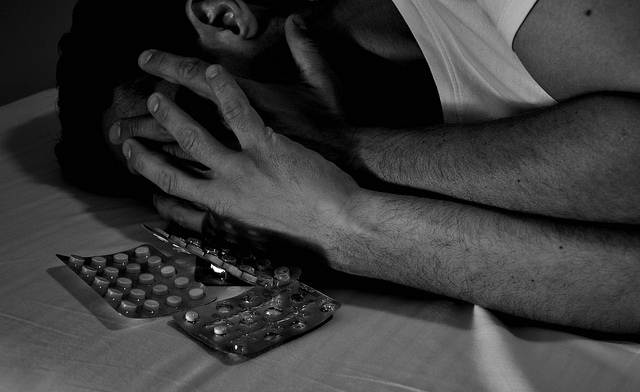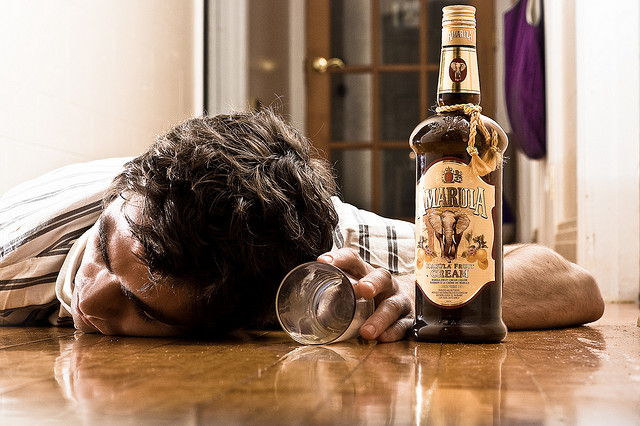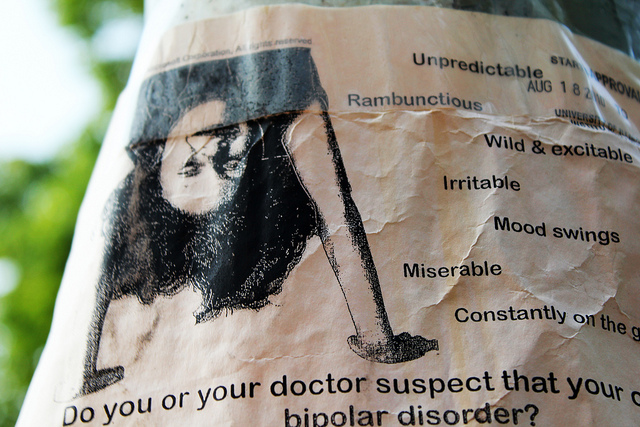Trigger warnings: Discussion of depression, bipolar disorder, substance abuse, anxiety, suicide, and sexual assault.
If you suffer from a mental illness, you are not alone. According to the National Alliance on Mental Illness, one out of every four American adults experiences the symptoms of a mental illness in any given year.
Think of a group of yourself and three of your besties. Now imagine the possibility that one of you could be suffering from a mental illness. Mood disorders, like depression and bipolar disorder, are one of the leading causes of hospitalizations, the third highest actually, for adults between the ages of 18 and 44. That’s us twenty-somethings.
Suicide remains the tenth leading cause of death in this country. It ranks as the third highest cause of death among those aged 15 to 24, also us twenty-somethings. Mental illness impacts a lot of us, and in more ways than we think.
As a person who works in mental health and has also had her own struggles, I’ve seen firsthand the nature of the beast. There can always be more mental health awareness, and there needs to be. I spoke with four twenty-somethings, who all decided to remain anonymous for their own reasons, about their experiences of living with a mental illness. I asked them about the diagnoses that they have, what kind of treatment they’ve sought – if any, how their diagnosis impacts their daily lives, and what they would want other people to know about their diagnosis.

Photo via Victor Casale
Interviewee #1: A 24-year-old female who suffers from depression.
This interviewee revealed to me that she first noticed signs of depression in herself as a teenager. She was formally diagnosed as an adult. She identifies a history of trauma as the most likely trigger, having been sexually assaulted as a teenager.
For this interviewee, depression causes her to struggle with a daily lack of motivation, feelings of hopelessness and guilt, and the feeling that nothing that she does will ever change her feelings or make a difference. This interviewee often stated that she feels “responsible” for her depression in that she tries to help herself feel better (she has a list of healthy coping skills that she utilizes), but doesn’t always feel better. She blames herself for feeling depressed.
On a daily basis, she finds that she is tired, has difficulty completing tasks, doesn’t feel as if she thinks things through thoroughly when she makes decisions, and has minimal appetite. She would like for others to know that depression isn’t just feeling “sad.” The feeling encompasses so many other emotions and can be debilitating depending on the degree. She feels that more understanding is needed to help those with depression. I couldn’t agree with her more.

Photo via Freddie Peña
Interviewee #2: A 28-year-old female dealing with anxiety.
Interviewee number two has been dealing with anxiety for as long as she can remember. Her life is somewhat different, being that she is bound by certain cultural and religious practices. She has always felt a certain degree of pressure to act and be a certain way, some of which differs from who she truly feels that she is.
For her, the pressure causes a terrible sense of anxiety that manifests itself in racing thoughts, insomnia, irritability, crying spells, tightness in the chest, difficulty breathing, and feeling emotionally paralyzed. This interviewee has spoken to a primary care doctor about her feelings, but not a mental health professional. She actually received information from a friend about a psychiatrist that is local to her recently and has committed to calling him because she is completely exhausted from feeling this way.
She would like for others to understand that anxiety is a real thing, not just that feeling you get when you are worried. She believes that anxiety disorders are minimized because life is stressful in general and we all have problems. For her, anxiety is the negative way that her feelings manifest themselves in her life. This gives her something to deal with on top of life’s problems.

Photo via Alexandre Normand
Interviewee #3: A 23-year-old male battling substance abuse.
I decided to include substance abuse in this article because some people overlook this issue when talking about mental health. I don’t think people realize that they can go hand in hand.
This interviewee agreed. He grew up in a home with an abusive, alcoholic father. Somehow, he managed to pick this up as a coping skill as a teenager. He drinks to self-medicate, but it never works. At first he feels that his drinking is “social” and that he can handle it, but without fail, it usually grows into something much bigger.
At this current time, the interviewee is on probation for driving under the influence. His blood alcohol level was twice that of the legal limit in his state. He is unable to drive his vehicle, is doing community service, and paying off court costs, probation, and an attorney. It wasn’t until after he went to jail and hurt loved ones that he realized the true impact that drinking had on his life.
The interviewee had never been to any treatment for his drinking before because he “didn’t think it was a problem.” He still finds himself struggling with the urge but is surrounded by supportive friends who hold him accountable. As part of his legal requirements, he has been evaluated for substance abuse issues and will be looking at going to therapy to address his drinking and the underlying issues.
He would like for others to know that people who use substances are not bad people. They are people with problems too and although drinking or using other drugs is just a temporary fix for those problems, the issue is that these people need help, not to be shamed.

Photo via Quinn Dombrowski
Interviewee #4: A 25-year-old female grappling with the highs and lows of bipolar disorder.
Interviewee number four has always known that something was different about the way she feels and experiences life. She has been in and out of therapy for the last seven years and has was slapped with nearly every label in the book before she was properly diagnosed with Bipolar I Disorder two summers ago.
Her disorder has manifested itself in her life through impulsivity that has caused her to rack up a significant amount of credit card debt, bouts of promiscuity, periods where she oversleeps, and periods where there’s no sleep, anger and irritability, self-injury, and feelings of hopelessness to the point of wanting to and attempting to commit suicide.
She has worked closely with her doctors to develop a regime that works for her. She takes her medications faithfully as prescribed, although she doesn’t always want to, she tries to exercise and sleep regularly and has a ton of healthy coping skills as well as supportive people around her that she can be honest about her feelings and diagnosis with. There are days when she feels “stable” and days where she feels “volatile” but does her best to communicate as well as give herself space when she needs it.
She would like for others to know that having Bipolar Disorder doesn’t make you “crazy.” She feels that the general public has an idea of what they think a person with this disorder looks like, violent, unstable, dangerous. Every person that you see on the news that has committed a crime does not fit the bill for this disorder. Every person with this disorder is different. Every person with any disorder is different. She believes the best way to decrease stigma is by increasing awareness, openness, and understanding.
We are all impacted by mental health at some point in our life, whether it’s through our own battle or in helping a loved one through the trenches of their struggle or in the aftermath of a life lost to the battle. Mental health and substance abuse issues are things that require care each and every day.
This is why it is so important for people to be knowledgeable. People fear and loathe what they don’t understand. There needs to be more discussion, more awareness.
If you’re looking for more information, take a look at some of the wonderful national resources listed below:
National Alliance on Mental Illness
National Suicide Prevention Lifeline
Depression and Bipolar Support Alliance
Anxiety and Depression Association of America
Rape, Abuse & Incest National Network
Substance Abuse and Mental Health Services Administration
